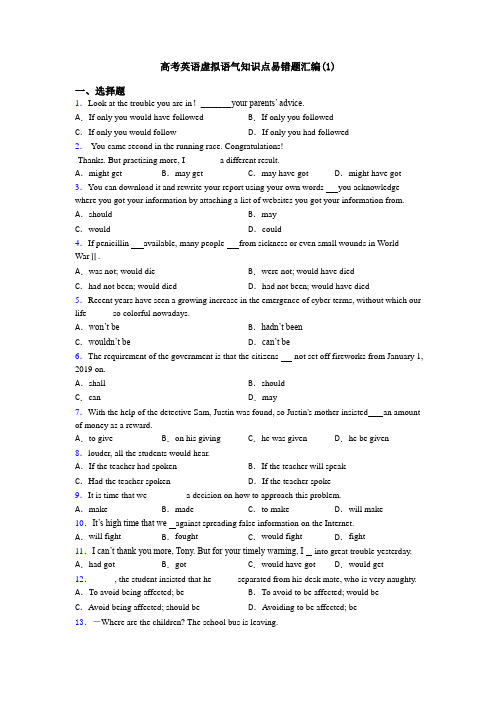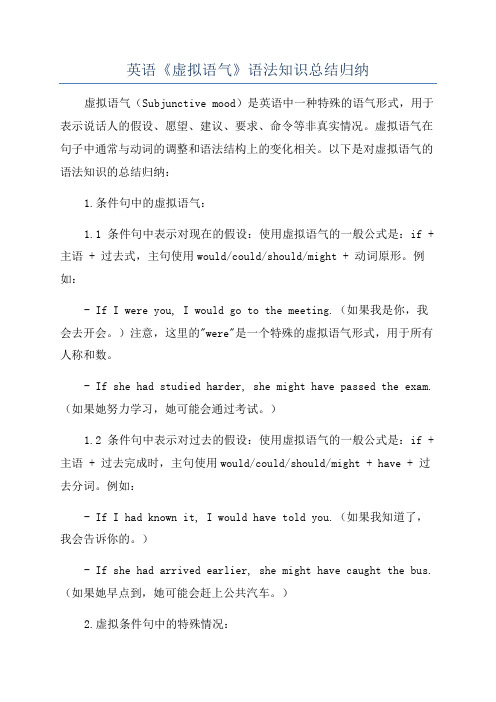英语总复习虚拟语气难点、易错点(1)
虚拟语气重难点分析

虚拟语气重难点分析一、虚拟语气的使用范围:虚拟语气用来表示说话人的主观愿望或假想,而不表示客观存在的事实,所说的是一个条件,不一定是事实,或与事实相反。
虚拟语气通过谓语动词的特殊形式来表示。
语气是区别说话人说话口气的语法范畴,英语中的语气分为三种:陈述语气、祈使语气、虚拟语气。
在这三种语气中,虚拟语气有着特殊的表达形式,主要用来表达非真实的假设。
该语法主要用于if 条件状语从句中,也可用于主语从句、表语从句和宾语从句等。
二、虚拟语气的判断:1. if 条件状语从句中虚拟语气的判断。
if 条件状语从句有真实条件句和非真实条件句。
假设条件可以实现的句子为真实条件句,反之为非真实条件句,要用虚拟语气。
其形式分为以下三种:(1)与过去事实相反的假设。
结构为:从句的谓语动词用“had + 过去分词”,主句用“should (would,could, might) + have + 过去分词”。
Eg: If I had been invited, I would have come to the party.(实际情况是:当时没有邀请我,我也没有去。
)(2)与现在事实相反的假设。
结构为:从句的谓语动词用过去式,系动词用were,主句的谓语用“should (would, could, might) + 动词原形”。
Eg: If I could help you, I would help you. (实际情况是:我现在不能帮你,也不会帮你。
)(3)与将来事实相反的假设。
结构为:从句的谓语动词用“should (were to) + 动词原形”,主句用“should (would, could, might) + 动词原形”。
Eg: If it were to /should rain tomorrow, I would say in bed all day long.(实际情况是:明天不大可能会下雨,我也不大可能睡一整天。
高考英语虚拟语气知识点易错题汇编(1)

高考英语虚拟语气知识点易错题汇编(1)一、选择题1.Look at the trouble you are in!_______your parents’ advice.A.If only you would have followed B.If only you followedC.If only you would follow D.If only you had followed2.-You came second in the running race. Congratulations!-Thanks. But practising more, I _______ a different result.A.might get B.may get C.may have got D.might have got 3.You can download it and rewrite your report using your own words you acknowledge where you got your information by attaching a list of websites you got your information from. A.should B.mayC.would D.could4.If penicillin available, many people from sickness or even small wounds in WorldWarⅡ.A.was not; would die B.were not; would have diedC.had not been; would died D.had not been; would have died5.Recent years have seen a growing increase in the emergence of cyber terms, without which our life _____ so colorful nowadays.A.won’t be B.hadn’t beenC.wouldn’t be D.can’t be6.The requirement of the government is that the citizens not set off fireworks from January 1, 2019 on.A.shall B.shouldC.can D.may7.With the help of the detective Sam, Justin was found, so Justin's mother insisted an amount of money as a reward.A.to give B.on his giving C.he was given D.he be given 8.louder, all the students would hear.A.If the teacher had spoken B.If the teacher will speakC.Had the teacher spoken D.If the teacher spoke9.It is time that we ________ a decision on how to approach this problem.A.make B.made C.to make D.will make10.It’s high time that we against spreading false information on the Internet.A.will fight B.fought C.would fight D.fight11.I can’t thank you more, Tony. But for your timely warning, I into great trouble yesterday. A.had got B.got C.would have got D.would get12._____, the student insisted that he _____ separated from his desk mate, who is very naughty. A.To avoid being affected; be B.To avoid to be affected; would beC.Avoid being affected; should be D.Avoiding to be affected; be13.-Where are the children? The school bus is leaving.- I wish they ______ always late.A.aren’t B.weren’t C.wouldn’t be D.hadn’t been 14.The people trapped in the ruins ____________ that rescue teams ____________ here without delay.A.desire; are sent B.desiring; were sentC.desire; be sent D.desiring; be sent15.If it ______ rain tomorrow, I should not drive my car.A.were to B.will C.would D.is to16.She insisted that she ________ to the disaster-hit area and that her request ________ reasonable.A.be sent, was B.should send, wasC.should be sent, be D.send, should be17.It might have saved me some trouble ______ the schedule.A.did I know B.have I knownC.do I know D.had I known18.The order came the soldiers the small village the next morning.A.that; had to leave B.that; should leaveC./; must leave D.when; should leave19.He’s working hard for fear that he _______.A.should fall behind B.fell behindC.may fall behind D.would fallen behind20.What a pity! You missed the sightseeing, or we ________ a good time together.A.had B.will have C.would have had D.had had21.His expression suggested that he ____the invitation and he suggested full preparations _____. A.had accepted; would be made B.accepted; be madeC.has accepted; make D.had accepted; be made22.Experts recommended parents _____their children to play computer games for more than an hour a day.A.not allow B.do not allow C.mustn’t allow D.couldn’t allow 23.Many things we benefit from now wouldn't be around _______ Albert Einstein.A.aside from B.thanks to C.but for D.regardless of 24.—How I wish I __________ fly to the moon!—Really? That would be great.A.can B.may C.should D.could25.What a pity! Considering his ability and experience, he ___________ it better.A.need have done B.must have doneC.can have done D.might have done【参考答案】***试卷处理标记,请不要删除1.D解析:D【解析】【详解】考查虚拟语气。
初中英语语法重难点专项讲解之虚拟语气

初中英语语法重难点专项讲解之虚拟语气虚拟语气表示说话人的愿望、假设、猜测或建议,而不是事实。
虚拟语气是通过句中的谓语动词的特殊形式来表现的,因此,掌握虚拟语气中的各种谓语动词的形式变化,是掌握虚拟语气的关键。
一、虚拟语气在简单句中的用法虚拟语气用于简单句中,一般表示祝愿、命令等。
谓语动词要用原形。
二、虚拟语气在主从复合句中的用法(1)在状语从句中的用法1、条件句中的用法虚拟语气的条件句是用谓语动词的特殊形式来表现与现在、过去事实相反的情况或对将来发生的情况表示怀疑,和直陈语气条件句中的谓语动词形式以及表达的含义完全不同。
虚拟语气条件句中所用的谓语动词的过去时、过去完成时、过去将来时等,只表示不同的虚拟语气,和直陈语气的过去时、过去完成时、过去将来时等毫无关系。
现将虚拟语气的各种具体形式和用法分述如下;a. 表示与现在事实相反的情况①形式条件从句的动词形式主句的动词形式If I (we,you,he,she,it,they)+行为动词的过去式(be的过去式一般用were) I (we) should You (he,she , +动词原形或:they,it ) would所有人称+might(could)+动词原形②用法:If I had more time, I should study German.(fact:I have no more time, so I shall not study German. )If she were not so busy, she would attend the meeting this afternoon.(fact:she is very busy, so she will not attend the meeting this afternoon.)If they didn’t take physical exercises every day, they wouldn’t be so healthy.(fact: they take physical exercises every day, so they are very healthy.)b. 表示与过去誓死相反的情况①形式;条件从句的动词形式主句的动词形式If I (we,you,he,she,it,they)+had+过去分词 I (we) shouldYou (he,she , +have+过去分词或:they,it ) would所有人称+could(might)+have+过去分词②用法:I would have checked my paper again if I had had more time at yesterday’s examination.(fact:I had no more time at yesterd ay’s exam, so I didn’t check my paper again)You would have already recovered from his illness if he had seen the doctor in good time.(fact: He didn’t see the doctor in good time ,so he hasn’t recovered from his illness )c. 表示与将来事实相反的情况①形式:条件从句的动词形式主句的动词形式a. If I (we,you,he,she,it,they)+行为动词的过去式(be的过去式一般用were)通常要与一个表将来的时间的状语连用b. If (we,you,he,she,it,they)+should+动词原形c. If I (we,you,he,she,it,they)+were to+动词原形 I (we) should You would +动词原形或:he(she,it ) would they wouldI (we,you,he,she,it,they)+could(might)+动词原形②用法:If it rains tomorrow, our picnic will be put off.(The weather has been changeable these days.)If it rained tomorrow, our picnic would be put off.( The weather has beenvery good these days.)If it should rain tomorrow, our picnic would be put off.(That would be out of our expectation.)If it were to rain tomorrow, our picnic would be put off. (条件从句谓语动词用were to +动词原形,表示下雨的可能性极小。
英语虚拟语气难点、易错点(1)

B.were ,would join D.were ,will join
【答案】B 【解析】 试题分析:虚拟语气是一种特殊的动词形式,用来表示说话人所说的话并不是事实,而是 一种假设、愿望、怀疑或推测。其主要有三种结构: 1、与现在事实相反 若与现在事实相反,条件从句的谓语用过去式(be 通常用 were),主句谓语用“should (would, could, might)+动词原形” 2、与过去事实相反 若与过去事实相反,条件从句的谓语用过去完成时(had+过去分词),主句谓语用“should (would, could, might)+have+过去分词” 3、与将来事实相反 若与将来事实相反,条件从句的谓语用过去式(be 通常用 were),主句谓语用“should (would, could, might)+动词原形”。 句意:如果我是你,我会加入军队。结合语境可知本句描述的是与现状相反的事实,故选 B。 考点:考查虚拟语气。
12.— I don’t know what to wear at the party.
— If I
you, I would wear a shirt and a tie.
A.am
B.is
C.were
D.was
【答案】C
【解析】
试题分析:if 从句的虚拟语气,对于现在的虚拟用一般过去式,be 动词都用 were,故选 C.
1.57.---What would you do if you a million dollars?
---If I you, I’d give it to medical research.
A.got, were B.win, am C.won, am D.get, were
[高考英语]英语虚拟语气重点难点把握
![[高考英语]英语虚拟语气重点难点把握](https://img.taocdn.com/s3/m/964fae6631b765ce05081478.png)
虚拟语气重点难点把握虚拟语气一直都被认为是英语学习中的一个难点,因此也便成为了各类考试的热点。
现就虚拟语气的一些问题归纳如下,以帮助解决拟语气这个语法难点。
一、动词wish后宾语从句中的虚拟语气1.用wish表示现在的祝愿和报歉。
其句子结构为:宾语从句的谓语be和were(was),实义动词用过去式。
例:I wish the were at home this time.2.用wish表示对过去事情的遗憾。
其句子结构为:宾语从句的谓语用过去完成时或could+现在完成时。
例:I wish I hadn’t hurt him so much。
3.用wish表示对将来事情的愿望。
其句子结构为宾语从句的谓语为would/could/might+动词原形。
例:I wish I might be able to come tomorrow 。
二、用在一般虚拟条件句中的虚拟语气(一)表示与现在、过去、将来事实相反的假设1.与现在事实相反的假设。
其句子结构为:从句:if+主语+动词的过去式(be变were)+其他主句:主语+would(should, could, might)+动词原形+其他例:If I were you, I would go with him.2.与过去事实相反的假设。
其句子结构为:从句:If+主语+过去完成时+其他主句:主语+should(would, could, might)+现在完成时+其他。
例:If you had studied harder last term, you could have passed exam.3.表示对将来事实实现的可能性不大的假设。
其句子结构为:从句:If+主语+should (were to )+动词原形+其他主句:主语+would (could, should, might)+动词原形例:If he were to go tomorrow. He might tell you.(二) 从句和主句要根据各自发所生的时间选用符合具体时间的虚拟语气形式1.从句表示过去,主句表示现在。
英语《虚拟语气》语法知识总结归纳

英语《虚拟语气》语法知识总结归纳虚拟语气(Subjunctive mood)是英语中一种特殊的语气形式,用于表示说话人的假设、愿望、建议、要求、命令等非真实情况。
虚拟语气在句子中通常与动词的调整和语法结构上的变化相关。
以下是对虚拟语气的语法知识的总结归纳:1.条件句中的虚拟语气:1.1 条件句中表示对现在的假设:使用虚拟语气的一般公式是:if + 主语 + 过去式,主句使用would/could/should/might + 动词原形。
例如:- If I were you, I would go to the meeting.(如果我是你,我会去开会。
)注意,这里的"were"是一个特殊的虚拟语气形式,用于所有人称和数。
- If she had studied harder, she might have passed the exam.(如果她努力学习,她可能会通过考试。
)1.2 条件句中表示对过去的假设:使用虚拟语气的一般公式是:if + 主语 + 过去完成时,主句使用would/could/should/might + have + 过去分词。
例如:- If I had known it, I would have told you.(如果我知道了,我会告诉你的。
)- If she had arrived earlier, she might have caught the bus.(如果她早点到,她可能会赶上公共汽车。
)2.虚拟条件句中的特殊情况:2.1 在虚拟条件句中表示命令、建议时,主句中的动词可以使用动词原形(而不是would/could/should/might + 动词原形)。
例如:- If you have any questions, please let me know.(如果你有任何问题,请告诉我。
)- If I were you, I would take a break.(如果我是你,我会休息一下。
【高考复习】高考英语易错点:虚拟语气易错点解剖

【高考复习】高考英语易错点:虚拟语气易错点解剖高考英语易错性:虚拟语气i虚拟语气在if引导的条件句中的易错点。
①如果我的律师周六没来,他会阻止我去的。
②ifyouhadstudiedhardatschool,youwouldbeacollegestudentnow.句子① 和② 在条件句中使用虚拟语气,从句假设过去的情况,所以他们使用过去完成时态,但在主句中使用句子① 还是指过去的情况,谓语动词是would havedo,and②包含表示现在的时态,因此必须理解为假设现在的情况,因此,谓语动词必须是would/should/may+动词的原始形式。
学生经常忽略现在的存在,以句子的形式填写答案①.ⅱ虚拟语气在名词性从句中的用法1.重要的(奇怪的、自然的、必要的……+那句话或它已经决定(命令、建议、要求、建议……)在主语从句中,谓语动词经常使用(应该)+动词的原始结构,表示某事是“重要的”、“必要的”、“确定的”等例如:①itisimportantthateveryone(should)obeytherulesalldayandallnight.②决定明天下午开会。
2.suggest,insist后面指宾语从句时需注意的地方1)当“建议”和“提出”时,下列宾语从句的谓语动词通常是“应该+动词原型”例如:hesuggestedthatthework(should)bestartedatonce他建议立即动工。
在这些动词变成被动语态后(例如,它建议+主语从句),主语从句的谓语动词仍然使用“(应该)+动词的原始形式”这些动词变名词(如suggestion)后,其后的表语从句和同位语从句中的谓语部分仍用“(should)+动词原形”② 当“建议(观点)、暗示、启发”时,下列宾语从句的动词不使用虚拟语气。
例如:(1)thepolicesuggestedthatthethiefmightbeoneofthefamilymember警察局暗示小偷可能是他的家人。
人教版英语英语总复习虚拟语气难点、易错点

人教版英语英语总复习虚拟语气难点、易错点一、初中英语虚拟语气1.—I don’t know what to wear at the party.— If I you, I would wear a shirt and a tie.A.am B.is C.were D.was【答案】C【解析】试题分析:if从句的虚拟语气,对于现在的虚拟用一般过去式,be动词都用were,故选C.句意:——我不知道聚会该穿什么。
——如果我是你,我会穿一件衬衫加一条领带。
故选C 考点:if条件句的虚拟语气点评:if条件句的虚拟语气,是中考要求掌握的知识点,分为三种情况:表示与现在事实相反的情况,从句谓语动词用一般过去式(be用were),主句谓语动词用should/would/could/might +do;2.表示与过去的事实相反的情况,从句谓语动词用过去完成时,主句谓语动词用should/would/could/might+have done;3.表将来的事实相反的情况,从句谓语动词用should+动词/did/were to do,主句谓语动词用should/would/could/might +do。
2.Luckily, he wasn’t driving fast at the time of accident; otherwise, I am sure, it _______ a more serious accident.A.would be B.were C.would have been D.had been【答案】C【解析】【详解】句意:幸运的是,事故发生时他没有开快车;否则,我相信,这将是一个更严重的事故。
考查虚拟语气。
根据“wasn’t driving”是过去进行时,所以此处是对过去的虚拟,主句时态应用情态动词+have done,故选C。
3.Yesterday, the storm delayed us. _______ the storm, we would have been here in time. A.But for B.If it were not for C.But that D.Unless【答案】A【解析】【详解】句意:昨天暴风雨耽搁了我们。
- 1、下载文档前请自行甄别文档内容的完整性,平台不提供额外的编辑、内容补充、找答案等附加服务。
- 2、"仅部分预览"的文档,不可在线预览部分如存在完整性等问题,可反馈申请退款(可完整预览的文档不适用该条件!)。
- 3、如文档侵犯您的权益,请联系客服反馈,我们会尽快为您处理(人工客服工作时间:9:00-18:30)。
英语总复习虚拟语气难点、易错点(1)一、初中英语虚拟语气1.If I ____ a candle, I would light the world bright.A.am B.are C.be D.were【答案】D【解析】试题分析:句意:如果我是一根蜡烛,我将点亮这个世界。
if I were 如果我是…,were虚拟语气,be动词都用were,故选D考点:if条件句的虚拟语气点评:if条件句的虚拟语气,是中考要求掌握的知识点,分为三种情况:表示与现在事实相反的情况,从句谓语动词用一般过去式(be用were),主句谓语动词用should/would/could/might +do;2.表示与过去的事实相反的情况,从句谓语动词用过去完成时,主句谓语动词用should/would/could/might+have done;3.表将来的事实相反的情况,从句谓语动词用should+动词/did/were to do,主句谓语动词用should/would/could/might +do。
2.If I _____ one million dollars, I________ travel around the world with my parents. A.have; will B.had; will C.had; will D.had; would【答案】D【解析】试题分析:如果我有一百万美元,我要和我的父母环游世界。
结合语境可知主句描述的是将来动作,用将来时态。
从句中是对将来的虚拟,故用过去时态。
选D。
考点:if引导的条件状语从句点评:虚拟语气是一种特殊的动词形式,用来表示说话人所说的话并不是事实,而是一种假设、愿望、怀疑或推测。
其主要有三种结构:1、与现在事实相反若与现在事实相反,条件从句的谓语用过去式(be通常用were),主句谓语用“should (would, could, might)+动词原形”2、与过去事实相反若与过去事实相反,条件从句的谓语用过去完成时(had+过去分词),主句谓语用“should (would, could, might)+have+过去分词”3、与将来事实相反若与将来事实相反,条件从句的谓语用过去式(be通常用were),主句谓语用“should (would, could, might)+动词原形”:3._______ in order to sit for the college entrance exam?A.What did she suggest he read B.What did she suggest he readsC.Did she suggest for him to read D.Did she suggest what he read【答案】A【解析】【详解】句意:为了参加大学入学考试,她建议他读什么书?考查虚拟语气。
suggest表示“建议”时,后接从句用that sb should do,should可省。
特殊疑问句的结构是特殊疑问词+be动词(助动词)+主语+其他?故选A。
4.Yesterday, the storm delayed us. _______ the storm, we would have been here in time. A.But for B.If it were not for C.But that D.Unless【答案】A【解析】【详解】句意:昨天暴风雨耽搁了我们。
要不是有暴风雨,我们会及时赶到这里的。
考查连词。
But for要不是+短语;If it were not for要不是(用于对现在的虚拟);But that 要不是+从句;Unless除非,后接条件状语从句;根据句中是“the storm”,是名词,所以排除C;根据“would have been ”,是对过去的虚拟排除选项B;分析句子“___ the storm, we would have been here in time.”有暴风雨,我们会及时赶到这里的,应该是“要不是”,故选A。
5. If my mother ___ I get a grade of 50 in English exam, she would be angry.A.knows B.knewC.has known D.would know【答案】B【解析】试题分析:句意:如果我的母亲知道我英语考试成绩是50分,她会生气的。
表示与现在事实相反的事实,该用一般过去时态,所以选B。
考点:考查虚拟语气。
6.If I __________you. I would buy a big house for my parents.A.be B.am C.was D.were【答案】D【解析】试题分析:句意:如果我是你。
我会买一个大房子给我的父母。
这道题考查的是假设,所以要用虚拟语气,用过去时。
故选D.考点:考查虚拟语气的用法。
7.----What can I do with so much money?----If I _______ you, I _______ give it away to charity.A.am, will B.am, would C.were, would D.was, would【答案】C【解析】试题分析:考查虚拟语气。
句意你如何处理这些钱?如果我是你,我会把它捐给慈善机构。
表示对现在的虚拟,if引导的从句用一般过去时,语句用would do ,故选C项。
考点:考查虚拟语气。
【答案】D【解析】试题分析:句意:如果天气是好的,我们的运动会就不会推迟了。
这里是虚拟语气,根据wouldn’t可知这是对现在的虚拟,在条件状语中对现在的虚拟用were;put down 镇压,记下;put up提供; put off推迟。
根据句意故选D。
考点:考查虚拟语气的用法。
8.The air pollution is worse and worse. The government suggests that people ____ to work by subway or by bus.A.go B.goes C.going D.to go【答案】A【解析】【详解】句意:空气污染越来越糟糕。
政府建议人们乘地铁或者乘公交车去上班。
考查谓语动词。
A. go 去;B. goes 去;C. going 在去;D. to go 为了去。
这是一个that引导的宾语从句,suggest后跟的宾语从句应用虚拟语气(should)do结构,should可省略。
故选A。
9.If I ____you, I _____the army.A.am, would join B.were ,would joinC.am, will join D.were ,will join【答案】B【解析】试题分析:虚拟语气是一种特殊的动词形式,用来表示说话人所说的话并不是事实,而是一种假设、愿望、怀疑或推测。
其主要有三种结构:1、与现在事实相反若与现在事实相反,条件从句的谓语用过去式(be通常用were),主句谓语用“should (would, could, might)+动词原形”2、与过去事实相反若与过去事实相反,条件从句的谓语用过去完成时(had+过去分词),主句谓语用“should(would, could, might)+have+过去分词”3、与将来事实相反若与将来事实相反,条件从句的谓语用过去式(be通常用were),主句谓语用“should (would, could, might)+动词原形”。
句意:如果我是你,我会加入军队。
结合语境可知本句描述的是与现状相反的事实,故选B。
考点:考查虚拟语气。
10.If I ______ you, I ______invite him to go to see a movie.A.am;would B.were;will C.were;would D.was;will【答案】C【解析】试题分析:句意:如果我是你,我会邀请他去看电影。
go to see a movie去看电影;invite sb to do邀请某人做某事;在表达与现在事实相反的虚拟语气中,Be用were,主句用would。
考点:考查虚拟语气。
11.--What would you do if you ____ a million dollars?--I’d give it to the charityA.win B.won C.will win D.is to win【答案】B【解析】试题分析:句意:如果你赢了一百万美元,你要做什么?——我会把它捐给慈善机构。
结合语境可知条件从句中描述的是与将来相反的事实,故用一般过去时态,选B。
考点:if引导的条件状语从句点评:虚拟语气是一种特殊的动词形式,用来表示说话人所说的话并不是事实,而是一种假设、愿望、怀疑或推测。
判断是真实条件句还是非真实条件句。
只有在非真实条件句中才使用虚拟语气。
通过句子意思,看假设的条件是否能够实现,能够实现是真实条件句,不能使用虚拟语气;假设的条件不能实现则是非真实条件句,要用虚拟语气.判断这个假设是与哪个事实相反。
1、与现在事实相反若与现在事实相反,条件从句的谓语用过去式(be通常用were),主句谓语用“should (would, could, might)+动词原形”2、与过去事实相反若与过去事实相反,条件从句的谓语用过去完成时(had+过去分词),主句谓语用“should (would, could, might)+have+过去分词”3、与将来事实相反若与将来事实相反,条件从句的谓语用过去式(be通常用were),主句谓语用“should (would, could, might)+动词原形”:12.--- If I_______ one million dollars, I would give it to medical research.---If I _______ you, I would give it to charity.A.will have, am B.would have, was C.had, were D.have, is【答案】C【解析】考察虚拟语气。
第一空,虚拟语气,与现在相反,用过去时。
第二空,虚拟语气,与现在相反,用过去时,be动词用were。
故选C13.I don’t u nderstand how you got a ticket. I always you a careful driver.A.think; are B.am thinking; areC.thought; were D.think; were【答案】C【解析】【详解】句意:我不明白你是怎么得到罚单的。
